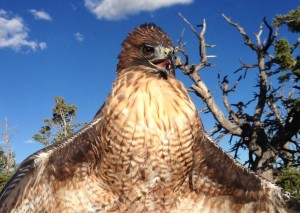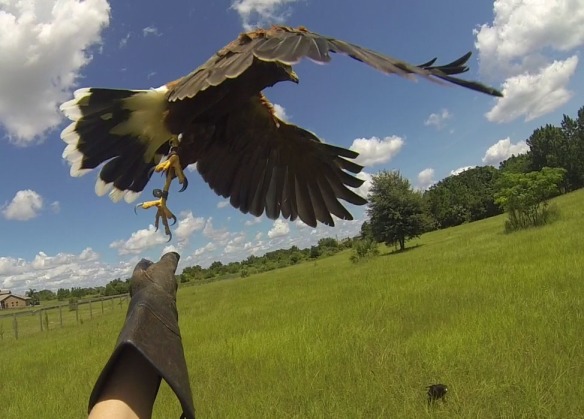Last week we held the first ever Intro to Falconry Workshop at ARC.We had a great group of raptor enthusiasts come and learn more about the sport, and it was really a blast. To prepare, I made a booklet on becoming and being a falconer for each participant, and I thought it would be fun to post some excerpts here.
Since the US Fish and Wildlife Service stepped away from regulating falconry in 2012, the rules for becoming a falconer are now a bit different in every state, especially regarding the types of birds apprentices can/can’t have. Generally, they all have the same requirements, but I only really know about Florida laws because that’s where I live, and where I practice falconry.
It’s worth noting that falconry is illegal in two states – Washington DC (although the surrounding states seem to have active falconry clubs – Virginia especially), and Hawaii. Many of Hawaii’s native birds are threatened, endangered, or already extinct, so they can’t have escaped falconry birds flying around eating their endangered species (the feral cat and mongoose populations do enough of that already).
Before you start, it’s best to figure out if falconry is really for you. A hawk or falcon isn’t like having a pet. Even on the days when you don’t go hunting, a bird requires at least an hour a day to clean/feed/care for it. A good idea is to look online and see if there’s a falconry club near you, and go to a meet. Talk to some falconers and see if this is really something you want to commit to.
Because falconry really is a commitment, even before you get a bird. From start to finish, you want to budget about a year to get your permit. This includes the time it takes to find a sponsor, acquire equipment/housing, and process your permit. If you want to have your bird for the fall season, you want to start working on your permit twelve months before. I wish I was kidding, but that’s really how long it takes sometimes – four months of mine was permit processing alone.
In Florida (and most states, honestly) there are three main requirements for an apprentice falconry permit.
- The Falconry Exam – A general exam consisting of 100 questions about falconry laws, techniques, terms, raptor biology, natural history, ID, and other related subjects. It is administered by Florida Fish and Wildlife at one of their offices. You must score at least 80/100 to pass.
- You do not need a sponsor to take the exam, although a sponsors experience is helpful in studying for the test.
- A Sponsor – Before you apply for a permit, you must have a General or Master class falconer who is willing to oversee your apprenticeship and training and make sure you don’t screw up.
- Housing – This is kind of a no-brainer, but you need a place for your bird to live. At least an outdoor weathering mews, as well as adequate perching and equipment. Your facilities will be inspected by a Fish and Wildlife officer before approval of your permit.
Once you get your sponsor, pass your test, build a mews, send in your application and pass inspection, The Wait begins. Permit approval times can vary wildly from person to person. Some people get their apprentice falconry permit fairly quickly – I’m convinced mine got shoved under a stack of papers for three months, but it did finally arrive.
After you get your permit, the real fun begins!



Hello, my name is Luis I’m 21 years old and I live in the most southern part of Florida. Islamorada, Fl. in the Florida keys I have a great deal of interest in taking up falconry, I have slept on the decision of making a big commitment like this. As a matter of fact I’m already building my mews. I have contacted my local wildlife commission to take the exam as well. I really hope you can point me in the right direction of a general or master falconer in my area! Thank you.
Hi Luis! We actually spoke on the phone today. If you’re looking for a falconer to sponsor you, your best bet is to contact the Florida Hawking Fraternity http://f-h-f.org/contacts.htm They should be able to connect you with someone down south. Good luck on your test!